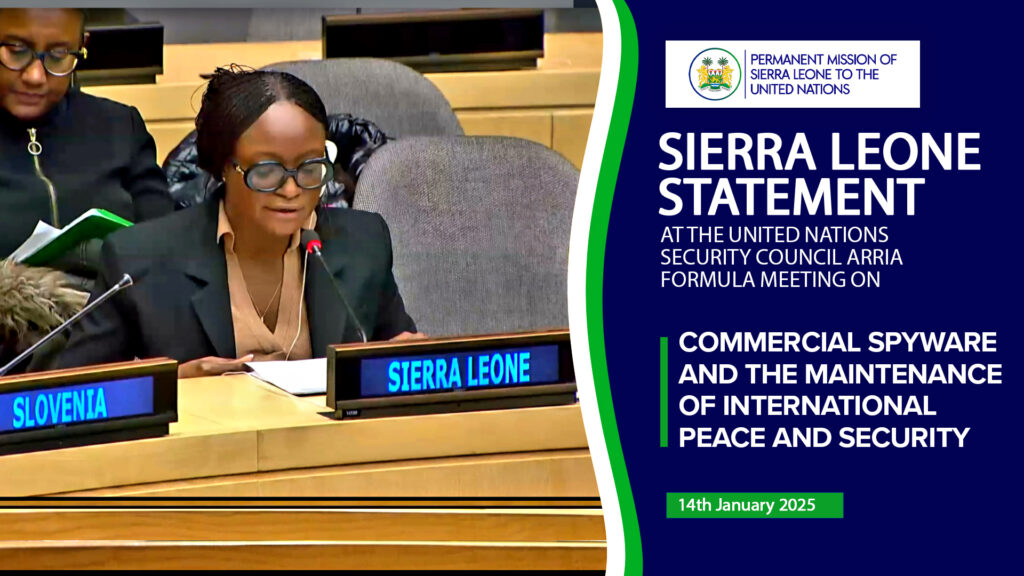STATEMENT BY
Ms. Sonia Umu Karim
Minister Councillor and Deputy Political Coordinator
I thank you Chair.
- Sierra Leone thanks the United States for convening this Arria formula meeting, co-sponsored by Australia, Austria, Canada, Estonia, France, Japan, Latvia, Lithuania, the Netherlands, Poland, the Republic of Korea, and the United Kingdom.
- I thank the briefers John Scott-Railton, of Citizen Lab at the University of Toronto; Shane Huntley, from Google’s Threat Analysis Group; and Julia Gavarrete, for their helpful presentations.
- Digital economies, which rely on the collection of data, are rapidly growing on every continent, as existing and emerging technologies provide opportunities for supporting sustainable economic development.
- Additionally, data is increasingly recognized as a strategic asset, integral to policymaking, private and public sector innovation, and for creating new entrepreneurial opportunities for businesses and individuals. However, the misuse of technologies and in particular those that are used in data collection, which puts significant power in the hands of the data acquirers, while leaving targeted individuals and institutions vulnerable, can threaten the positive opportunities. Furthermore, the use of data collection for surveillance purposes poses its own unique challenges.
Chair,
- There is no gain saying that commercial spyware, which is specifically created and marketed to secretly gather data about an entity without their knowledge, threatens fundamental and basic rights of privacy, calling for sustained and concerted efforts to establish guardrails against their misuse.
- In addition to threatening fundamental freedoms and human rights, commercial spyware also threatens democratic values and the effective functioning of public institutions. In the hands of malignant non-state actors, they pose a serious threat to international peace and security, as we have seen with the deliberate targeting of public officials, media, civil society, and even UN personnel. Disinformation campaigns, identity theft, human trafficking, and online child abuse are all consequences of unauthorized access to private information and the misuse of data.
- In this regard, given the universal accessibility to the digital space and cross border data flows, the protection of technology and data from misuse necessitates harmonization of international, regional and national efforts to combat this threat.
- At the international level, the Budapest Convention on Cybercrime of 2001 creates an actionable framework for international harmonization and cooperation on cybercrime, by providing guidelines for countries to develop their national legislation and to establish a framework for international cooperation, which is crucial for the investigation and prosecution of trans-national cybercrime. It is important that international efforts aimed at securing the cyberspace, augmenting cyber-hygiene, strengthening cybersecurity, and building cyber-resilience keep abreast of emerging technologies and software, such as the emerging threats to privacy protection posed by Artificial Intelligence. Existing international human rights conventions, treaties and norms for protection of citizens’ rights and protection of property are important and must be upheld.
- Sierra Leone welcomes the adoption of the United Nations Convention against Cybercrime by the General Assembly of the United Nations on 24 December 2024 in New York. The Convention is the first comprehensive global treaty on this matter, which provides States with a range of measures to be undertaken to prevent and combat cybercrime. It also aims to strengthen international cooperation in sharing electronic evidence for serious crimes.
- We also note efforts by the UN Human Rights Council to raise awareness and address the potential threats posed by surveillance technology including commercial spyware to the exercise of human rights and fundamental freedom.
Chair,
- As African countries seek to harness the economic and social benefits of digitalization and e-commerce and noting the limitations of most countries in setting up the appropriate infrastructure for data protection, both the African Union and other sub-regional organizations such as ECOWAS have collaborated with states to develop comprehensive guiding frameworks in this regard.
- The African Charter on Human and Peoples’ Rights, the Convention on Cyber Security and Personal Data Protection, also known as the Malabo Convention in 2014, the AU Data Policy Framework for Africa, and the ECOWAS Supplementary Act on Personal Protection of Data, all aim to ensure that safeguards are put in place to ensure protection of personal data and privacy as a fundamental right, uphold international law in cybersecurity governance, and ensure responsible state behaviour in cyberspace in the region.
- In demonstrating their commitment to the global framework for lawful and responsible use of surveillance technologies, countries should internally regulate the development, use, domestic sales and transfer, dissemination and the export of products that are used for data collection, and work closely with technology partners and civil society groups to raise awareness and set standards.
- Sierra Leone’s Constitution guarantees the right to privacy and the protection of private property including data (Chapter 3 of 1991 Constitution). As a signatory to the Budapest Convention on Cybercrime, Sierra Leone has passed several laws including the Cyber Security and Crime Act (2021), and the Data Protection Act (2022) which address cyber threats, digital crimes and data security, and protect the national information infrastructure and intellectual property and privacy rights.
- Chair, in closing, Sierra Leone recognizes that whilst serious advancements are made at a national level, the threat posed by the misuse of data, including in conflict situations, requires sustained effort at the global level to ensure that fundamental human rights of the UN Charter are upheld. Countries should fully commit to international treaties and norms protecting individual rights.
- Further, noting the imbalance in technological capacity and infrastructure amongst countries, we call for strengthening collaborative mechanisms for technology and knowledge transfer, capacity building and funding, for developing effective good governance and legal/regulatory frameworks for responsible use of technologies in both the public and private sectors, in line with the Global Digital Compact.
I thank you.



